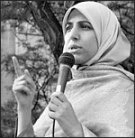“On the Moral Maze last night, which discussed the place of religious symbols such as the Muslim veil and the Christian cross in public life, one of our witnesses was Nai’ma B Robert, a convert to Islam who wore the niqab or full-face veil. She spoke well, although I thought naively, about how she chose to wear the niqab as an ‘act of worship’ – naively because she was unwilling to face up to the political purpose of the veil and its role as a symbol of the jihad which is used to recruit more people to the cause of Islamising society and to demoralise and intimidate its victims. That is why not just the niqab but also the hijab has been banned from public places in Turkey and Indonesia.”
Category Archives: Hijab
Feminism, imperialism and the veil
“Muslim women who adopt the veil in Europe may simultaneously be seeking to affirm their religious identity while being determined to enter the public sphere as full and equal citizens. They are often also trying to change the cultural and political meaning of the veil in a contemporary context. For some it may be linked to patriarchal pressure, for others a symbol of identity and emancipation in a commodified and patriarchal society – and for many a response to a religious vocation. Feminist politics needs to be flexible and respond to these complexities. And for Muslim women their religion and even their gender are not the only, or the most grievous, focus of their oppression – their bodies have also been, and continue to be, a battleground for European and US imperialism.
“Lord Cromer, British consul general in Egypt in the late 19th century, famously justified British colonial rule by arguing that it could liberate Egyptian women from their oppressive veils…. When the US launched its war on terror in Afghanistan in 2001, George Bush glorified his aims by stating: ‘Because of our recent military gains in much of Afghanistan, women are no longer imprisoned in their homes … The fight against terrorism is also a fight for the rights and dignity of women.’ The US social anthropologists Saba Mahmood and Charles Hirschkind have noted that the relationship between the neoconservative Bush administration and some US feminists was reciprocal and intimate….
“Those feminists who give well-meaning lectures to Muslim women on what they should think, say and wear are not in the end alone. There is a risk that their powerful female voices will inadvertently sustain another political discourse: the words and actions of an illustrious line of men who continue to justify their imperial ambitions on the bodies, often dead bodies, of Muslim women.”
Maleiha Malik in the Guardian, 19 October 2006
Anthony Glees: Internment should be a policy option
“Academics should think the unthinkable. We should not be blinkered by political correctness. People need to speak up. They shouldn’t be made to be afraid. Increasingly universities are becoming mental corsets because of over-regulation. I’ve had universities threatening legal action, vice-chancellors calling for me to be prevented from doing research. And it’s these people who claim to be for freedom of speech.
“The legal profession has taken the European Convention far too far in a way that is inappropriate in a country that’s at war. The convention is deeply flawed. It was set up in 1948 and it is not right for now. At the moment we are at war, the fact that it is being fought in Iraq and Afghanistan conceals that fact. The law has been used to favour the perpetrator, not the persecuted. We need to think about how we should behave to people who consider us enemies, whether they are British citizens or people who are in Britain seeking asylum.
“Internment in the second world war is called MI5’s darkest hour, but internment was a very effective way of keeping the country safe from Nazi subversion. People say that the vast majority of those interned were Jews, and they would be the last people to act in a subversive way. In fact research shows that there were some Jews in Britain as agents of the Third Reich. Their families were in the hands of the Gestapo and they were blackmailed. And some say that internment in Northern Ireland made the situation better. Internment needs to be talked about. There shouldn’t be things that shouldn’t be considered – if they can help.
“The German equivalent of MI5 is called the Office for the Protection of the Constitution. Liberal democracy will be easily destroyed if we do not act against extremism. We give our enemies the weapons they need to destroy us. We need to be more mindful that there is a threshold that should not be crossed. Not everything is permissible. Wearing the niqab is saying we don’t want to be British. Forty per cent of British Muslims say they want to live under sharia law. That is unacceptable. They should go to a country with sharia law.”
Anthony Glees in the Independent, 19 October 2008
‘Why I would ban the full veil in universities’
Yet another pseudo-rational excuse for discrimination against Muslims – this one from Lorraine Harding.
Want to wear the veil? Go and live somewhere else, says the Sun
Editorial in today’s Sun:
TONY Blair yesterday threw his weight behind Jack Straw’s call for Muslim women to drop the veil. The Prime Minister backed the school chiefs who suspended a teacher for refusing to remove her mask in front of pupils. The veil, he said, is a visible statement of separation and is “incompatible” with life in Britain, echoing Mr Straw’s earlier concerns.
Modern Muslim women agree the veil is a primitive throwback to an age when their oppressed sisters were treated little better than slaves. In benighted parts of the world, they still are.
Britain has a hard-won heritage of fairness and equal rights. It is the main reason so many migrants came here in the first place. Those who have taken advantage of such privileges must not be allowed to turn back the clock. It’s time to take a leaf out of Australian Prime Minister John Howard’s book. And tell extremists that if they want to live under Sharia law, they can’t live here.
Blair says veil is a mark of separation, Cruddas launches campaign
Tony Blair has said that the veil worn by many Muslim women in Britain is a “mark of separation” that makes people from other backgrounds feel uncomfortable. The Prime Minister came off the fence in the heated debate over Muslim customs by urging them to integrate more fully into British society. His remarks confirmed a significant shift in the Government’s thinking amid fears that its support for multiculturalism may have encouraged the growth of “parallel lives” that never meet.
At his monthly Downing Street press conference, the Prime Minister was asked if a woman who wore the veil could make a full contribution to British society. He paused before replying: “That’s a very difficult question. It is a mark of separation and that’s why it makes other people from outside of the community feel uncomfortable.” He added he was not suggesting women should be ordered to remove their veils. “No one wants to say that people don’t have the right to do it, that’s to take it too far, but I think we do need to confront this issue about how we integrate people properly with our society,” he said.
Jon Cruddas, MP for Dagenham, who will formally launch his campaign to become Labour’s next deputy leader today, will accuse ministers of playing “fast and loose” with religious tensions during the row. He will say: “The solution does not lie in an ever more muscular bidding war among politicians to demonstrate who can be tougher on migrants, asylum-seekers and minorities. Nor is it in using racial or religious symbols to create controversy. That only makes the situation worse. It is not the role of politicians to play fast and loose with symbols of difference, especially when they drive the political centre of gravity to the right as a consequence.”
Racism is the real obstacle we face – Salma Yaqoob
 “This week I’ve been told that women like myself are submissive, oppressed creatures who need rescuing by white, male politicians. But at the same time, I’ve been told that women like myself frighten white, male politicians and that we are a threat to social cohesion in this country.
“This week I’ve been told that women like myself are submissive, oppressed creatures who need rescuing by white, male politicians. But at the same time, I’ve been told that women like myself frighten white, male politicians and that we are a threat to social cohesion in this country.
“Frankly I’m getting fed up with other people’s obsessions being projected on people like me.
“If the government wants to tackle barriers to integration, how about tackling some of the real obstacles that we encounter? And, in this country, the widespread imposition of Islamic dress is not one of them – by any stretch of the imagination. In fact post 9/11, the most prevalent pressure on Muslim women is to NOT wear Islamic dress, out of fear for their personal safety.
“That’s not to say that cultural and patriarchal pressures do not exist in the Muslim community. They do – and many of us are actively engaged in challenging them. I defend the right of women to choose, for themselves, to wear the niqab or hijab. But I equally defend the right of women to choose not to wear particular forms of dress, whether it’s in Saudi Arabia, Afghanistan, Iran or Britain.”
Salma Yaqoob in Socialist Worker, 21 October 2006
This carry-on about Muslim dress
 “It was refreshing to read the article by Martin Newland (G2, October 16). He is the only commentator who seems to understand that women choose to wear the Niqab as an expression of their faith and that you can still be a ‘regular person’, albeit religious.
“It was refreshing to read the article by Martin Newland (G2, October 16). He is the only commentator who seems to understand that women choose to wear the Niqab as an expression of their faith and that you can still be a ‘regular person’, albeit religious.
“I am a Muslim woman, as well as a practising barrister, past Labour parliamentary candidate, human-rights adviser to the mayor of London and past worker for the UN mission in Kosovo. But I fast, give zakat (alms), have performed Haj, say the salat (prayers), do not drink, and am proud to call myself Muslim, will never wear a short dress or a bikini etc.
“At the same time, I love, like many of my Muslim friends and family, watching Carry On films, Benny Hill, Rory Bremner, Have I Got News for You, love fish and chips, and have friends from all religions, cultures and backgrounds. Go and talk to and get to know a Muslim. Then you will know they are no different to anyone else.
“I always thought the best thing about being British was that as long as you obeyed the laws, you could lead your life as you wanted. And yet we are all being pushed into one straightjacket. Just as people who want to ‘take their kit off’ have the right to do so, so should people who want to ‘keep their kit on’. This debate has already got some nasty undertones to it – and a lot of underlying ignorance.”
Yasmin Qureshi, letter in the Guardian, 18 October 2006
An excellent letter, only slightly undermined by some questionable aesthetic judgements. I mean – Benny Hill? Are you sure about that, Yasmin?
Labour accused of aiding extremists by its focus on Muslim issues
Incitement to violence
 “Where is this political opportunism taking us? Into the dark tunnel of national strife. The corrosive effect of the political and media onslaught against British Muslims is having its impact on all sections of society. What is claimed to be an assertion of free speech and democratic rights is rapidly becoming the demonisation of a community. Once they are dehumanised, who cares for their democratic, civil or human rights?
“Where is this political opportunism taking us? Into the dark tunnel of national strife. The corrosive effect of the political and media onslaught against British Muslims is having its impact on all sections of society. What is claimed to be an assertion of free speech and democratic rights is rapidly becoming the demonisation of a community. Once they are dehumanised, who cares for their democratic, civil or human rights?
“Since John Reid demanded that Muslim ‘bullies’ must be faced down and Jack Straw declared the veil a ‘statement of separation’, ministers have fallen over themselves to make increasingly unbridled attacks on Muslims. The shadow home secretary, David Davis, has accused our communities of creating a ‘voluntary apartheid’ and colleges have taken action against veiled teachers and students. The tabloid press has declared open season on Muslims with one hostile front-page story after another.
“In practice this has amounted to incitement to violence. In recent weeks verbal and physical attacks on Muslims have surged alarmingly. Women have had their scarves ripped off. Mosques and Islamic centres in Preston and Falkirk have been attacked by mobs and firebombed.”
Daud Abdullah, deputy secretary general of the MCB, in the Guardian, 17 October 2006
